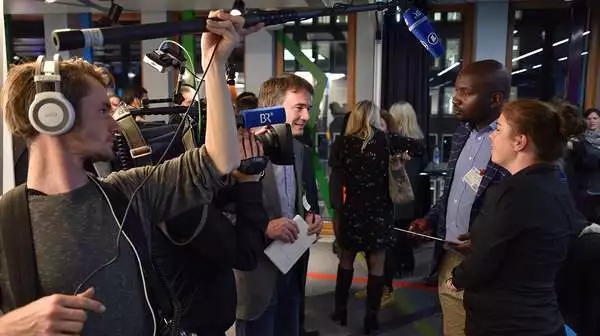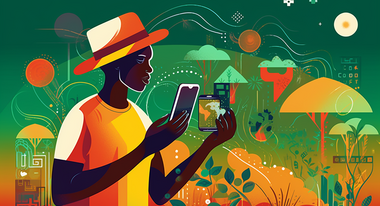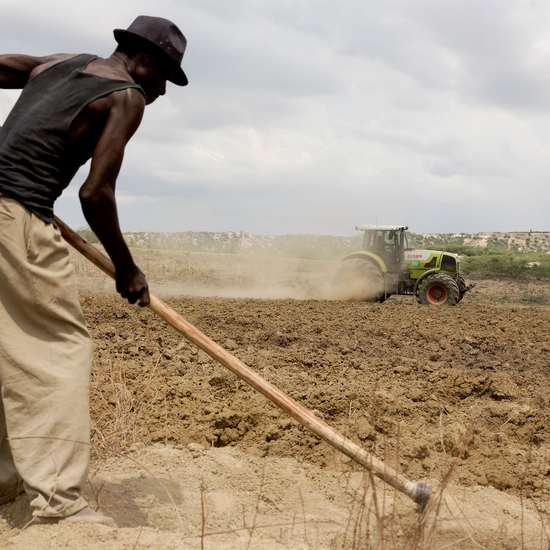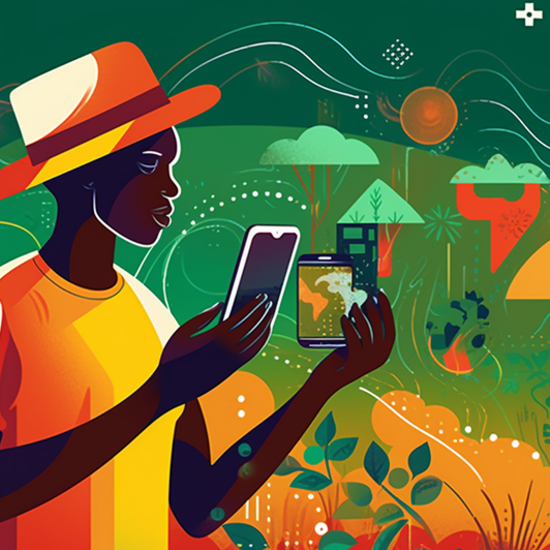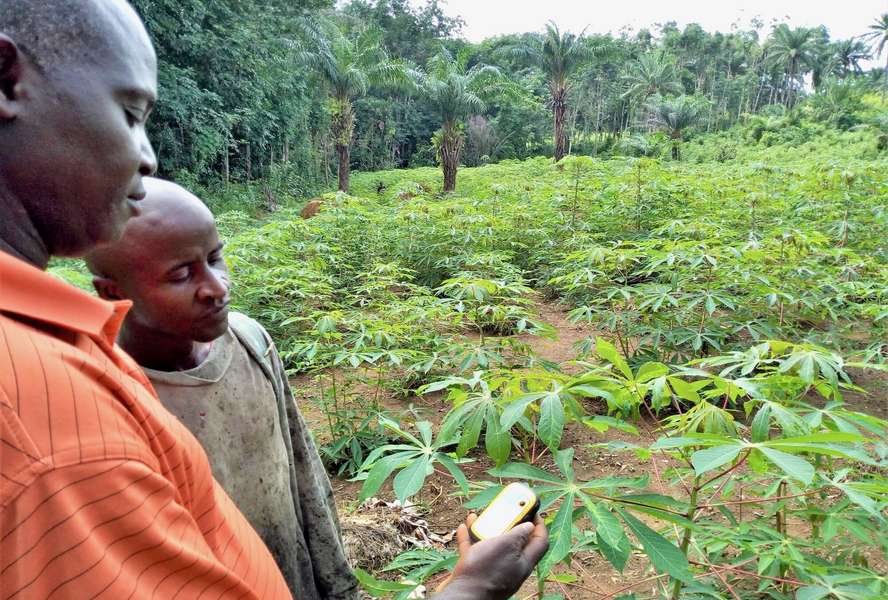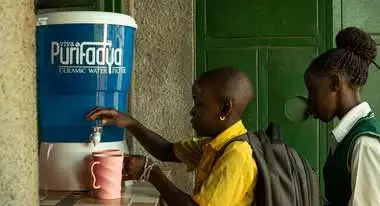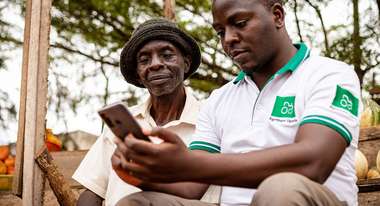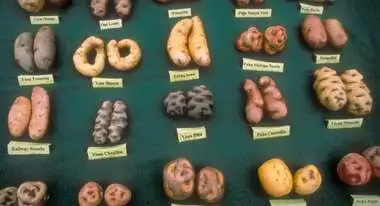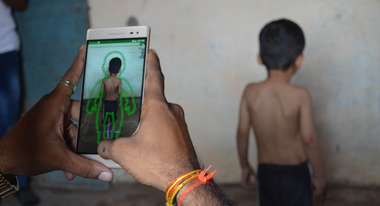Learn more about Welthungerhilfe's innovations: AgriShare, Child Growth Monitor, and Qur'an for Nutrition.
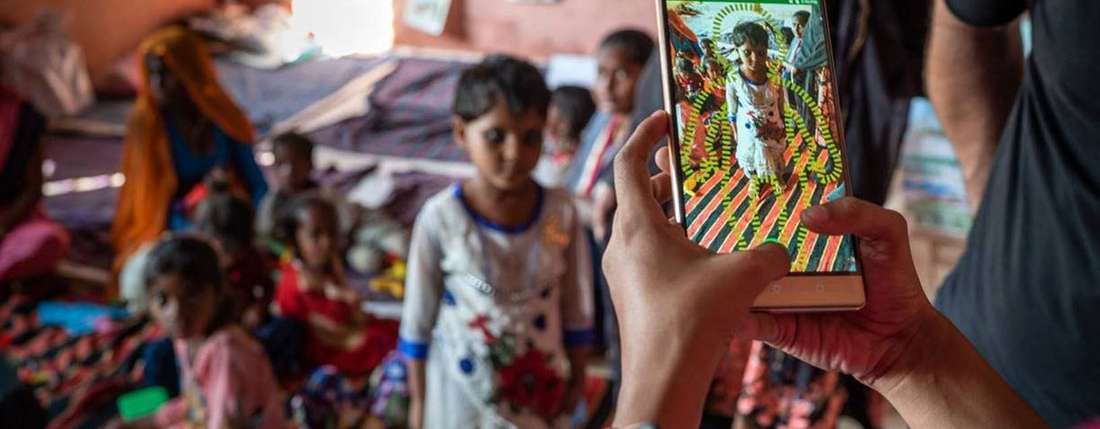
Innovation
Sharing ideas and scaling impact: Welthungerhilfe (WHH) works with global partnerships and social entrepreneurship to benefit people living in poverty. The global community has set its sights high: a world without hunger by 2030. To achieve this, 733 million hungry people must have secure access to food. Although the number of people suffering from hunger has fallen by almost a third since the beginning of the millennium, efforts must be tripled to achieve the goal by 2030. One way is to promote innovation – to make the most effective use of money and labor.
An idea only becomes an innovation when it is taken up and developed into a solution that gives people a benefit. Experts refer to this as 'incubation'. Innovations are also an important issue for Welthungerhilfe. Strong ideas have now emerged from various innovation competitions, and also from the creative work of WHH teams in various countries.
Challenge
The methods and approaches employed by WHH to fight hunger, malnutrition, and poverty have been tremendously successful in reducing hunger in our target communities. However, we understand the need for bolder, more ambitious approaches to meet our goal of eradicating hunger by 2030.
Unfortunately, rapid technological advancements can have negative impacts on the most marginalized. Many existing digital agricultural solutions don’t address core challenges faced by smallholder farmers and may even exacerbate inequalities due to the digital divide.
Moreover, a lack of financial and human resources hampers efforts to achieve sustainable food and nutrition security in vulnerable communities. For that reason, WHH promotes innovations that maximize the impact of available resources and address the obstacles faced by our target groups. This focus on innovation has developed WHH’s capability to cultivate and nurture disruptive ideas both internally and externally that complement our key focus areas.
Our approach
How WHH promotes innovation:
-
In-house Innovation Award for innovative projects
-
Transfer of innovative solutions to various project countries
-
Sharing innovative ideas with partners
-
Cooperation with private sector partners
The in-house Innovation Award honors innovative ideas. The 2022 competition focused on climate resilience and gender equality. In fact, two winners were chosen this time: Nature Now and Smiling Nature. With a solar-powered water pump made of recycled (plastic) waste, the Nature Now team wants to support smallholder farmers in Uganda to increase their productivity and their climate resilience. The Smiling Nature team from Haiti and Mali has developed the idea of planting trees with high carbon absorption and high nutritional value. In return for this contribution of the communities to climate resilience and food security, they receive a carbon credit, which serves as a source of income and enables them to eat a healthy and diversified diet.
The winners of the 2021 Innovation Award continue to develop their mobile vertical gardens. Small in footprint, mobile, and built from locally available materials, a mobile garden can produce enough vegetables for a family of five. The prototype is being developed jointly by WHH teams in Bangladesh and Sudan and will ideally mature into a version that will benefit people around the world.
WHH is also working on effective solutions in the fight against hunger in the digital realm:
AgriShare – bringing agricultural equipment to smallholder farmers
In many African countries, small farmers do not have access to the necessary agricultural equipment or means of transport to market their harvest. With a local partner organization from Zimbabwe, CTDO, WHH has developed AgriShare, a virtual marketplace for the rental of agricultural equipment. Large farms can use it to lend their tractors, trucks, or tools to small farmers. Food production increases and both sides benefit economically. The app was developed in Zimbabwe and is currently being rolled out in Uganda. It is managed in a social enterprise to ensure its economic sustainability.
Child Growth Monitor – digital game changer in detecting malnutrition and undernutrition
Diagnosing malnutrition in children is a laborious and difficult physical process. It involves the use of scales, measuring rods, and measuring tapes to determine the average circumference of the upper arm. The results of this manual process are often inaccurate and millions of children are not measured at all. This often results in children not receiving the nutrition and at times the life-saving treatment they need.
The idea for the Child Growth Monitor was born in a 2017 WHH innovation competition. It is an app that transforms cell phones into digital child measurement tools. Artificial intelligence and virtual reality are used in the process. A team of 15 developers is now working on getting the first full version of the app ready for use. Numerous partners from science, business, the IT sector, and non-governmental organizations are supporting this project.
Kurima Mari
A lack of information about agricultural production, marketing, as well as weather and climate and their impact on farming, makes it difficult for smallholder farmers in Zimbabwe to get the highest possible yield from their work.
With the help of the Kurima Mari app, which is specifically designed to meet the needs of smallholder farmers, they can obtain helpful information and tips about agriculture. These are specifically adapted to the respective region and the context of the users. The app has a strong marketing focus, helping smallholder farmers to sell their products. In addition, the Kurima Mari app includes a virtual marketplace where people can sell and buy.
The app was created through partnerships between WHH and other large NGOs, universities, and private sector companies, and is constantly being developed further. It is now also available in Malawi (under the name Zaulimi) and Uganda (under the name iKnowFarm) and supports agricultural development there as well.
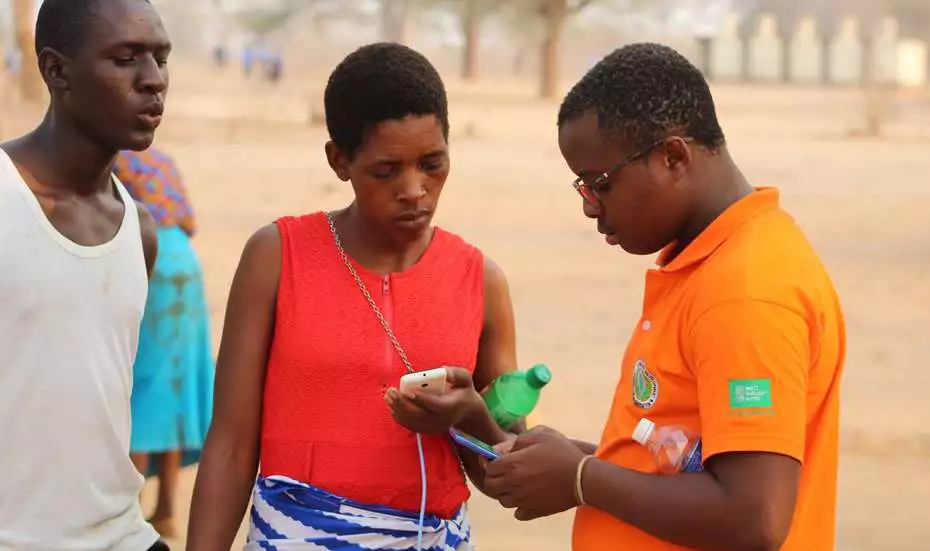
Social businesses at WHH
Social businesses can be a good platform for giving social solutions the widest possible reach – and thus the greatest possible impact. WHH has been involved in social businesses since 2017. Today, the organization is financially and operationally involved in a total of six different purpose-driven businesses in different countries in Africa. The businesses offer products and services designed for (particularly) in-need target groups, such as smallholder farmers, and are aligned with their specific needs.
In some cases, these social businesses have emerged from their own successful non-profit projects; in other cases, WHH joins forces with existing social businesses and supports them with operational structures, as well as its expertise in the rural context and markets. Most of its own digital products are also to be managed in social businesses to ensure their economic sustainability. Although WHH is represented on the supervisory boards of the social businesses, all companies have their own local management.
Wasap – from project to social business
Sanitation facilities such as showers, sinks, toilets or wells are unaffordable for many people in Sierra Leone – with negative effects on the health and economic situation of the population. Together with EMAS International, a German-based association promoting simple technologies for access to safe drinking water, and a local entrepreneur on the ground, Welthungerhilfe has transformed a former NGO project for affordable low-tech WASH solutions (solutions for water, sanitation, and hygiene) into a local low-tech start-up company: Water Sanitation Promotion Company Limited (Wasap).
The company was established in February 2020 and has since been selling sanitation equipment and WASH solutions, including DIY instructions on how to set up, and maintenance support, at affordable prices to poorer populations in the country.
SPOUTS of Water – joining forces for greater impact
Contaminated drinking water has significant negative health, economic and social impacts on the people of Uganda. Ugandan company SPOUTS of Water responded to these problems by producing locally manufactured Purifayaa ceramic water filters that effectively remove 99.99% of bacteria in water. Since its founding in 2014, SPOUTS of Water has already distributed more than 62,000 Purifayaa filters, providing more than 375,000 people with long-term access to safe drinking water. Welthungerhilfe has been working with the company since 2019. The goal: to make the product accessible, especially to the population in rural areas, and to support the Purifayaa filters on their way to a wider audience.
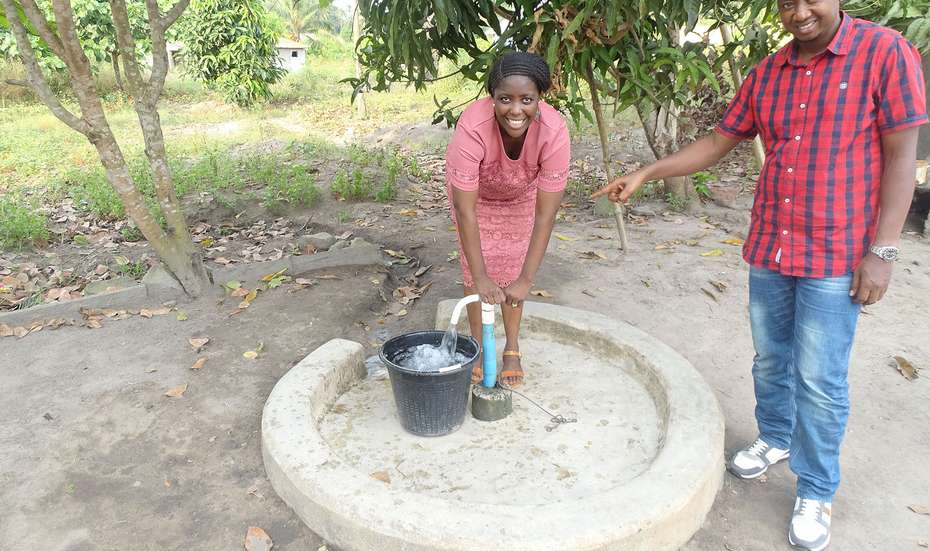
Our impact
The United Nations Sustainable Development Goals call for global partnerships to create sustainability and efficiency for the benefit of the poorest. That is why there are collaborations between development cooperation and the private sector. This creates new avenues for funding and economic sustainability guarantees long-term commitment.
WHH is entering into new partnerships with socially oriented companies to make products and services available to local people: in Uganda with locally produced water filters, in Zimbabwe with agricultural inputs and in Ethiopia with seedlings grown in a sterile nutrient solution.
More and more non-governmental organizations are opening up to private capital markets and private investment. WHH is also relying on the positive effects of a sustainable market economy. It is using its many years of experience to develop inclusive and social entrepreneurship into a strategic pillar of its work.





